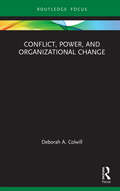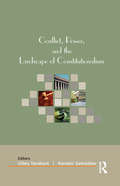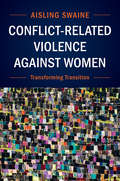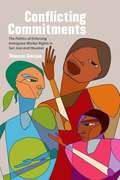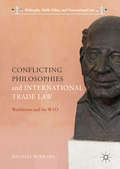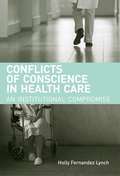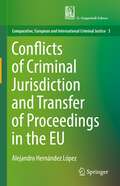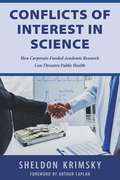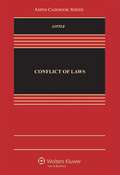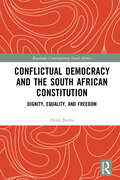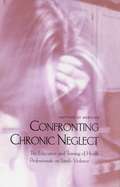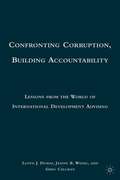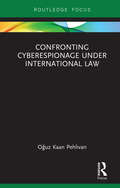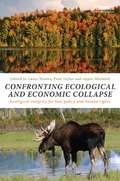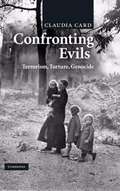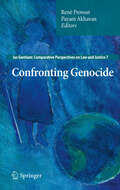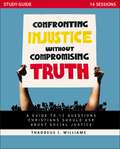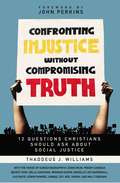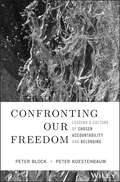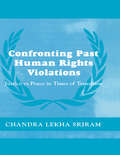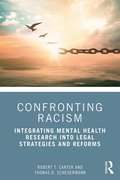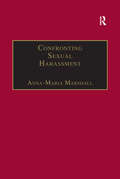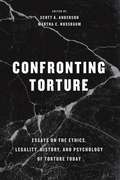- Table View
- List View
Conflict, Power, and Organizational Change (ISSN)
by Deborah A. ColwillA capacity for learning, adapting, and changing is an important facet of organizational resilience. What is involved in generative organizational change? Is it an event, a process, or constantly ongoing? What makes organizational change "good" for the organization? Who has the power to decide what is "good" for the organization and its members? How is it decided? What if there is strong disagreement or conflict? How is that handled? What is the role of organizational members and leaders in these discussions? As these questions demonstrate, the triad of change, power and conflict are intimately linked. The purpose of this book is to explore the topics of change, power and conflict as they relate to the experiences of everyday organizational life. It will provide readers the opportunity to reflect critically on their own local experience and involvement in organizations and to glean actionable wisdom for meaningful engagement and impactful contributions to their organization(s) in the present and future.Conflict, Power, and Organizational Change will be of interest to students, researchers, academics and professional colleagues interested in the fields of business and organizational studies, especially those wanting to get acquainted with the concepts of change, power and conflict in contemporary organizational settings.
Conflict, Power, and Organizational Change (Routledge Focus on Business and Management)
by Deborah A. ColwillA capacity for learning, adapting, and changing is an important facet of organizational resilience. What is involved in generative organizational change? Is it an event, a process, or constantly ongoing? What makes organizational change "good" for the organization? Who has the power to decide what is "good" for the organization and its members? How is it decided? What if there is strong disagreement or conflict? How is that handled? What is the role of organizational members and leaders in these discussions? As these questions demonstrate, the triad of change, power and conflict are intimately linked. The purpose of this book is to explore the topics of change, power and conflict as they relate to the experiences of everyday organizational life. It will provide readers the opportunity to reflect critically on their own local experience and involvement in organizations and to glean actionable wisdom for meaningful engagement and impactful contributions to their organization(s) in the present and future. Conflict, Power, and Organizational Change will be of interest to students, researchers, academics and professional colleagues interested in the fields of business and organizational studies, especially those wanting to get acquainted with the concepts of change, power and conflict in contemporary organizational settings.
Conflict, Power, and the Landscape of Constitutionalism
by Gilles TaraboutThe book seeks to critically examine the implication of a constitution of law for a political society. It presents a collection of essays that seek to investigate how power acts on power, how limits produce excess, how separation of powers produces the union of powers (sanctified by the very constitution that had guaranteed the division in the first place), and how the theory of separation is, at the same time, a myth and a reality. At the backdrop of the book, of course, is the theory that every good constitution rigorously separates the legislature, the executive, and the judiciary from one another to guarantee the independence of each of these powers, such that this separation results in life, liberty, and security. If a constitution, however, symbolises and produces power, precisely because it separates one site of power from another, it follows that it is power itself that is the limit of power. Constitutionalism as a political culture of laws, therefore, must explain the dynamics of power.The book addresses both constitutions and the societies in which they emerge. Many of the essays in this collection show how institutional practices originating from a legal text create a matrix of power that owes its life, neither to a contract between men, nor between the state and men, nor even between the society and men, but rather to relations established, organized, and formalized by laws. The collection is significant because it gives colonial and post-colonial experiences a justified place in studies of law and constitutionalism, for it shows that while Montesquieu, Kant, and Burke each in their own way were promoting the spirit of laws, a more significant history of law-making was being enacted in order to defend a particular rule, and a particular type of government on another side of the world. Based on comparative studies in several countries across three continents, the book centrally deals with issues of constitutionalism, politica
Conflict-Related Violence Against Women: Transforming Transition
by Aisling SwaineBy comparatively assessing three conflict-affected jurisdictions (Liberia, Northern Ireland and Timor-Leste), Conflict-Related Violence against Women empirically and theoretically expands current understanding of the form and nature of conflict-time harms impacting women. The 'violences' that occur in conflict beyond strategic rape are first identified. Employing both a disaggregated and an aggregated approach, relations between forms of violence within and across each context's pre-, mid- and post-conflict phase are then assessed, identifying connections and distinctions in violence. Swaine highlights a wider spectrum of conflict-related violence against women than is currently acknowledged. She identifies a range of forces that simultaneously push open and close down spaces for addressing violence against women through post-conflict transitional justice. The book proposes that in the aftermath of conflict, a transformation rather than a transition is required if justice is to play a role in preventing gendered violence before conflict and its appearance during and after conflict.
Conflicting Commitments
by Shannon GleesonIn Conflicting Commitments, Shannon Gleeson goes beyond the debate over federal immigration policy to examine the complicated terrain of immigrant worker rights. Federal law requires that basic labor standards apply to all workers, yet this principle clashes with increasingly restrictive immigration laws and creates a confusing bureaucratic terrain for local policymakers and labor advocates. Gleeson examines this issue in two of the largest immigrant gateways in the country: San Jose, California, and Houston, Texas. Conflicting Commitments reveals two cities with very different approaches to addressing the exploitation of immigrant workers-both involving the strategic coordination of a range of bureaucratic brokers, but in strikingly different ways. Drawing on the real life accounts of ordinary workers, federal, state, and local government officials, community organizers, and consular staff, Gleeson argues that local political contexts matter for protecting undocumented workers in particular. Providing a rich description of the bureaucratic minefields of labor law, and the explosive politics of immigrant rights, Gleeson shows how the lessons learned from San Jose and Houston can inform models for upholding labor and human rights in the United States.
Conflicting Philosophies and International Trade Law: Worldviews and the WTO (Philosophy, Public Policy, and Transnational Law)
by Michael BurkardThis book reveals how conflicting worldviews are at the root of public controversies on policy and trade issues. It highlights the particularly controversial disputes at the level of the World Trade Organization in the case of regulating beef-hormones and GMOs, aiming to show how negotiators of international agreements, members of dispute settlement bodies, and policy makers in general could have recourse to concepts of other disciplines such as epistemology and philosophy in order to address deadlocked legal disputes. Ultimately, the book is a manifesto for independent and critical research.
Conflicts in the Knowledge Society
by Sebastian HaunssIn Conflicts in the Knowledge Society, Sebastian Haunss demonstrates how conflicts relating to the international system of intellectual property have resulted in new cleavages in the knowledge society. Furthermore, he argues that new collective actors have emerged from these conflicts with the ability to contest the existing dominant order. With a focus on political opportunity structures, collective action networks and framing strategies, he combines a theoretical discussion of social change in the knowledge society with empirical analyses of four recent developments: software patents in Europe, access to medicines, Creative Commons licensing and Pirate Parties.
Conflicts of Conscience in Health Care: An Institutional Compromise
by Holly Fernandez LynchIn Conflicts of Conscience in Health Care, Holly Fernandez Lynch finds a way around the polarizing rhetoric associated with this issue by proposing a compromise that protects both a patient access to care and a physician's ability to refuse.
Conflicts of Criminal Jurisdiction and Transfer of Proceedings in the EU (Comparative, European and International Criminal Justice #3)
by Alejandro Hernández LópezFramework Decision 2009/948/JHA on the prevention and settlement of conflicts of exercise of jurisdiction in criminal proceedings established an ad hoc procedure for settling conflicts of criminal jurisdiction based on the mutual exchange of information and the establishment of direct consultations between the competent authorities with a view to reaching consensus on an effective solution. However, neither common legally binding criteria for deciding the best jurisdiction nor specific rules for the transfer of proceedings (which can occur after parallel proceedings have been identified) were established in this instrument, or in any other instrument adopted by the EU to date. This book analyses the current EU legal framework on conflicts of jurisdiction and transfer of criminal proceedings, paying special attention to its numerous shortcomings and loopholes from a fundamental rights and due process of law perspective. The book begins with an assessment of the various principles and grounds used by Member States for claiming criminal jurisdiction. Secondly, de lege lata EU procedure on the settlement of conflicts of criminal jurisdiction, as well as its implementation in Spain and Italy, are thoroughly examined. After discussing the main principles and fundamental rights at stake, the author proposes two alternative and original de lege ferenda models for the prevention and settlement of conflicts of criminal jurisdiction and transfer of criminal proceedings, exploring the different possibilities offered by the EU’s primary law.
Conflicts of Interest In Science: How Corporate-Funded Academic Research Can Threaten Public Health
by Sheldon Krimsky30+ Years of Peer-Reviewed Studies on the Corporate Ties and Vested Interests that Influence Scientific ResearchFor over 500 years, groups and organizations with political, economic, and personal interests have successfully exercised influence on the pursuit of scientific inquiry and knowledge. History is replete with examples like the Papal authority muddying research into studies of the cosmos, but far less attention is paid today to the various corporate and special interest groups who, through funding and lobbying efforts, have been able to shape the modern academic and scientific landscape to fit their agenda.In Conflicts of Interest Within Science, author Sheldon Krimsky compiles 21 peer-reviewed, academic articles that examine the complex relationship between the individual scientists conducting research and the groups who fund them. Ultimately, Krimsky’s call to action concerns a collective movement among authors, peer reviewers, corporations and journal editors to disclose the sources of their funding. By holding scientists and the groups that fund them more accountable through increased transparency, we as a society can begin to rebuild trust in the integrity of knowledge.
Conflicts of Law: Cases, Materials, and Problems (Aspen Casebook Series)
by Laura E. LittleAward-winning teacher Laura Little offers a progressive, innovative approach to teaching complex material in the new casebook, Conflict of Laws. In a subject where there are few "right" answers and plenty of room for debate, this casebook offers a contemporary alternative to the subject by connecting coverage of key issues and concepts to law practice using modern cases-and-problem pedagogy. Features: Award-winning teacher and respected author Laura Little brings her considerable expertise in federal courts, conflict of laws, and constitutional law to the subject. Well-balanced casebook presents the deep jurisprudential lessons imbedded in the conflict of laws subject matter. Proven cases-and-problems pedagogy helps students apply concepts. Maintains a clear presentation of doctrines relevant to current law practice. Thematic approach puts conflicts of law in the context of actual issues confronted in law practice. Clear, straightforward writing avoids the "hide the ball" approach of many other books and maximizes accessibility to difficult material. Innovative organization, beginning with personal jurisdiction, follows the way issues arise in litigation and highlights the importance of forum selection. Highly adaptable modular presentation allows professors to customize approach. Contemporary cases and hypotheticals allow students to apply rules to current situations, while hallmark cases maintain continuity with the development of the discipline. Full coverage of current topics such as Internet issues, same-sex marriage, choice of law clauses, and class actions. International and comparative materials cover global aspects of conflicts. Emphasis on the Restatement (Second) of Conflicts, now the predominant United States approach but insufficiently covered in most other texts. Online PowerPoint slides, charts, and diagrams support teachability. Comprehensive Teachers Manual includes answers to every problem, teaching suggestions, sample syllabi, and a graphical depiction of each main case, as well as unique insights and case backgrounds.
Conflictual Democracy and the South African Constitution: Dignity, Equality, and Freedom (Routledge Contemporary South Africa)
by Henk BothaHuman dignity, equality, and freedom are central to the South African Constitution. This book examines these values through a conflictual democratic lens, which views conflict, power, and disagreement as constitutive of democracy.The book explores the capacity of value-based constitutional interpretation to create openings for democratic dialogue and emancipatory social struggles. Conversely, it also assesses the ability of constitutional interpretation to normalise and depoliticise domination, inequality, and exclusion. The book uses a conflictual frame to shed light on the interplay between the universality of dignity, equality, and freedom and the particularity of the discourses and conventions that mediate their interpretation and enforcement. It argues that such a frame could enable realistic assessments of the ability of the constitutional order to safeguard spaces for emancipatory struggles and respond to radical demands for the reconstitution of society.Drawing on the text of the Constitution, case law, academic commentary, and constitutional, political, and critical legal theory, this book will be an important read for researchers of constitutional law and critical legal theory, both within South Africa and beyond.Henk Botha is a Professor in the Faculty of Law, Stellenbosch University, South Africa.
Confronting Chronic Neglect: The Education and Training of Health Professionals on Family Violence
by Committee on the Training Needs of Health Professionals to Respond to Family ViolenceAs many as 20 to 25 percent of American adults or one in every four people have been victimized by, witnesses of, or perpetrators of family violence in their lifetimes.. Family violence affects more people than cancer, yet it's an issue that receives far less attention. Surprisingly, many assume that health professionals are deliberately turning a blind eye to this traumatic social problem.The fact is, very little is being done to educate health professionals about family violence. Health professionals are often the first to encounter victims of abuse and neglect, and therefore they play a critical role in ensuring that victims as well as perpetrators get the help they need. Yet, despite their critical role, studies continue to describe a lack of education for health professionals about how to identify and treat family violence. And those that have been trained often say that, despite their education, they feel ill-equipped or lack support from by their employers to deal with a family violence victim, sometimes resulting in a failure to screen for abuse during a clinical encounter.Equally problematic, the few curricula in existence often lack systematic and rigorous evaluation. This makes it difficult to say whether or not the existing curricula even works.Confronting Chronic Neglect offers recommendations, such as creating education and research centers, that would help raise awareness of the problem on all levels. In addition, it recommends ways to involve health care professionals in taking some responsibility for responding to this difficult and devastating issue.Perhaps even more importantly, Confronting Chronic Neglect encourages society as a whole to share responsibility. Health professionals alone cannot solve this complex problem. Responding to victims of family violence and ultimately preventing its occurrence is a societal responsibility
Confronting Corruption, Building Accountability
by Lloyd J. Dumas Janine R. WedelThe crisis that nearly brought the world's financial house down in 2008 demonstrated clearly that the global economy cannot work where there is widespread deception, corruption and lack of accountability. Corruption and lack of accountability are also key reasons why international development assistance so often fails to deliver on its promise.
Confronting Cyberespionage Under International Law (Routledge Research in International Law)
by Oğuz Kaan PehlivanWe have witnessed a digital revolution that affects the dynamics of existing traditional social, economic, political and legal systems. This revolution has transformed espionage and its features, such as its purpose and targets, methods and means, and actors and incidents, which paves the way for the emergence of the term cyberespionage. This book seeks to address domestic and international legal tools appropriate to adopt in cases of cyberespionage incidents. Cyberespionage operations of state or non-state actors are a kind of cyber attack, which violates certain principles of international law but also constitute wrongful acquisition and misappropriation of the data. Therefore, from the use of force to state responsibility, international law offers a wide array of solutions; likewise, domestic regulations through either specialized laws or general principles stipulate civil and criminal remedies against cyberespionage. Confronting Cyberespionage Under International Law examines how espionage and its applications have transformed since World War II and how domestic and international legal mechanisms can provide effective legal solutions to this change, hindering the economic development and well-being of individuals, companies and states to the detriment of others. It shows the latest state of knowledge on the topic and will be of interest to researchers, academics, legal practitioners, legal advisors and students in the fields of international law, information technology law and intellectual property law.
Confronting Ecological and Economic Collapse: Ecological Integrity for Law, Policy and Human Rights
by Laura Westra Prue Taylor Agnès MichelotFrom the first appearance of the term in law in the Clean Water Act of 1972 (US), ecological integrity has been debated by a wide range of researchers, including biologists, ecologists, philosophers, legal scholars, doctors and epidemiologists, whose joint interest was the study and understanding of ecological/biological integrity from various standpoints and disciplines. This volume discusses the need for ecological integrity as a major guiding principle in a variety of policy areas, to counter the present ecological and economic crises with their multiple effects on human rights. The book celebrates the 20th anniversary of the Global Ecological Integrity Group and reassesses the basic concept of ecological integrity in order to show how a future beyond catastrophe and disaster is in fact possible, but only if civil society and ultimately legal regimes acknowledge the necessity to consider ecointegrity as a primary factor in decision-making. This is key to the support of basic rights to clean air and water, for halting climate change, and also the basic rights of women and indigenous people. As the authors clearly show, all these rights ultimately depend upon accepting policies that acknowledge the pivotal role of ecological integrity.
Confronting Evils: Terrorism, Torture, Genocide
by Claudia CardIn this new contribution to philosophical ethics, Claudia Card revisits the theory of evil developed in her earlier book The Atrocity Paradigm (2002), and expands it to consider collectively perpetrated and collectively suffered atrocities. Redefining evil as a secular concept and focusing on the inexcusability - rather than the culpability - of atrocities, Card examines the tension between responding to evils and preserving humanitarian values. This stimulating and often provocative book contends that understanding the evils in terrorism, torture and genocide enables us to recognise similar evils in everyday life: daily life under oppressive regimes and in racist environments; violence against women, including in the home; violence and executions in prisons; hate crimes; and violence against animals. Card analyses torture, terrorism and genocide in the light of recent atrocities, considering whether there can be moral justifications for terrorism and torture, and providing conceptual tools to distinguish genocide from non-genocidal mass slaughter.
Confronting Genocide (Ius Gentium: Comparative Perspectives on Law and Justice #7)
by Payam Akhavan René Provost"Never again" stands as one the central pledges of the international community following the end of the Second World War, upon full realization of the massive scale of the Nazi extermination programme. Genocide stands as an intolerable assault on a sense of common humanity embodied in the Universal Declaration of Human Rights and other fundamental international instruments, including the Convention on the Prevention and Punishment of the Crime of Genocide and the United Nations Charter. And yet, since the Second World War, the international community has proven incapable of effectively preventing the occurrence of more genocides in places like Cambodia, Yugoslavia, Rwanda and Sudan. Is genocide actually preventable, or is "ever again" a more accurate catchphrase to capture the reality of this phenomenon? The essays in this volume explore the complex nature of genocide and the relative promise of various avenues identified by the international community to attempt to put a definitive end to its occurrence. Essays focus on a conceptualization of genocide as a social and political phenomenon, on the identification of key actors (Governments, international institutions, the media, civil society, individuals), and on an exploration of the relative promise of different means to prevent genocide (criminal accountability, civil disobedience, shaming, intervention).
Confronting Injustice without Compromising Truth Study Guide: A Guide to 12 Questions Christians Should Ask About Social Justice
by Thaddeus J. WilliamsEnacting social justice is essential to the Christian faith. But the Bible's call to seek justice is not a call to superficial activism. True justice requires biblical wisdom and communal discernment.Maybe you're frustrated with a version of Christianity that doesn't seem to take justice seriously. Perhaps you've witnessed the rise of ideologies that brand themselves as 'social justice,' but you have a sense that something is off about them. Maybe you have a hunch that God offers a better way to do justice than what's offered by the snarky memes on our news feeds.In this 14-session, video-based study guide, teacher and lecturer Thaddeus Williams furthers the case he made in his book, taking study groups and individuals deeper into complex question of how to pursue a path of justice without compromising the truth of the gospel.Participants will watch video segments (DVD/streaming video sold separately), hear from a diverse range of experts, interact in group discussions, and answer personal reflection questions to discover what the Bible and the example of Jesus have to teach us about justice.Williams confronts religious and political tribalism and challenges participants to discover a compelling vision of justice for all God's image-bearers that offers hopeful answers to life's biggest questions and a way forward.Sessions Include:What is Social JusticeThe God QuestionThe Imago QuestionThe Idolatry QuestionThe Collective QuestionThe Splintering QuestionThe Fruit QuestionThe Disparity QuestionThe Color QuestionThe Gospel QuestionThe Tunnel Vision QuestionThe Suffering QuestionThe Standpoint QuestionConclusion
Confronting Injustice without Compromising Truth: 12 Questions Christians Should Ask About Social Justice
by Thaddeus J. WilliamsGod does not suggest, he commands that we do justice.Social justice is not optional for the Christian. All injustice affects others, so talking about justice that isn't social is like talking about water that isn't wet or a square with no right angles. But the Bible's call to seek justice is not a call to superficial, kneejerk activism. We are not merely commanded to execute justice, but to "truly execute justice." The God who commands us to seek justice is the same God who commands us to "test everything" and "hold fast to what is good."Drawing from a diverse range of theologians, sociologists, artists, and activists, Confronting Injustice without Compromising Truth, by Thaddeus Williams, makes the case that we must be discerning if we are to "truly execute justice" as Scripture commands. Not everything called "social justice" today is compatible with a biblical vision of a better world. The Bible offers hopeful and distinctive answers to deep questions of worship, community, salvation, and knowledge that ought to mark a uniquely Christian pursuit of justice. Topics addressed include:RacismSexualitySocialismCulture WarAbortionTribalismCritical TheoryIdentity PoliticsConfronting Injustice without Compromising Truth also brings in unique voices to talk about their experiences with these various social justice issues, including:Michelle-Lee BarnwallSuresh BudhaprithiEddie ByunFreddie CardozaBecket CookBella DanusiarMonique DusonOjo OkeyeEdwin RamirezSamuel SeyNeil ShenviWalt SobchakIn Confronting Injustice without Compromising Truth, Thaddeus Williams transcends our religious and political tribalism and challenges readers to discover what the Bible and the example of Jesus have to teach us about justice. He presents a compelling vision of justice for all God's image-bearers that offers hopeful answers to life's biggest questions.
Confronting Our Freedom: Leading a Culture of Chosen Accountability and Belonging
by Peter Block Peter KoestenbaumExplore the nature of modern leadership In Confronting Our Freedom, a team of dedicated leadership coaches delivers an exciting and engaging new take on management and leadership. Drawing on recent events in the market and in the world, including the Great Resignation, the COVID-19 pandemic, and widespread digital transformation, the authors invite you to reimagine ideas of freedom and accountability in the context of work. You’ll explore how freedom of action—for managers and employees—is what gives rise to true accountability, both in the community and in the workplace. In the book, you’ll also find: Discussions of the power and structure of freedom, including its implications for our own choices and lives Ways to shift the focus of your leadership and management to accountability and freedom Strategies for shifting the illusion of clear roles and expectations to one compatible with fully human organizationsA groundbreaking and incisive approach to managing and leading others in virtual, hybrid, and in-person settings, Confronting Our Freedom will be an eye opener for managers, executives, and other business leaders seeking to improve their ability to inspire others to their fullest potential.
Confronting Past Human Rights Violations: Justice Vs Peace In Times Of Transition (Cass Series On Peacekeeping)
by Chandra Lekha SriramThis book examines what makes accountability for previous violations more or less possible for transitional regimes to achieve. It closely examines the other vital goals of such regimes against which accountability is often balanced. The options available are not simply prosecution or pardon, as the most heated polemics of the debate over transitio
Confronting Racism: Integrating Mental Health Research into Legal Strategies and Reforms
by Robert T Carter Thomas D ScheuermannThis book proposes a comprehensive approach to confronting racism through a foundational framework as well as practical strategies to correct and reverse the course of the past and catalyze the stalled efforts of the present. It will do so by focusing on those specific aspects of law and legal theory that intersect with psychological research and practice. In Part I, the historical and current underpinnings of racial injustice and the obstacles to combating racism are introduced. Part II examines the documented psychological and emotional effects of racism, including race-based traumatic stress. In Part III, the authors analyze the application of forensic mental health assessment in addressing race-related experiences and present a legal and policy framework for reforming institutional and organizational policies. Finally, in part IV the authors advocate for a close, collaborative approach among legal and mental health professionals and their clients to seek redress for racial discrimination. Confronting Racism provides a framework for legal, mental health, and other related social science professionals and leaders to acknowledge and act on the harmful aspects of our societal systems.
Confronting Sexual Harassment: The Law and Politics of Everyday Life (Law, Justice and Power)
by Anna-Maria MarshallExamining the relationship between law and social change in the context of employees' everyday problems with sexual harassment, this volume elaborates a framework for studying the role of law in everyday acts of resistance - what the author calls the legal consciousness of injustice. The framework situates the analysis in the context of a specific social problem and its related legal domain. It de-centres the law by accounting for the way that social movements, counter-movements, policy makers and powerful institutions frame the debate surrounding the social problem. Drawing on frame analysis developed in social movement studies, this aspect of the approach specifically incorporates other schema and shows how law supports both oppositional and dominant interpretations of experience. Following the stages of a dispute, the framework then examines the way that people use frames to make sense of their experiences.
Confronting Torture: Essays on the Ethics, Legality, History, and Psychology of Torture Today
by Martha C. Nussbaum Scott A. AndersonTorture has lately become front page news, featured in popular movies and TV shows, and a topic of intense public debate. It grips our imagination, in part because torturing someone seems to be an unthinkable breach of humanity—theirs and ours. And yet, when confronted with horrendous events in war, or the prospect of catastrophic damage to one’s own country, many come to wonder whether we can really afford to abstain entirely from torture. Before trying to tackle this dilemma, though, we need to see torture as a multifaceted problem with a long history and numerous ethical and legal aspects.Confronting Torture offers a multidisciplinary investigation of this wrenching topic. Editors Scott A. Anderson and Martha C. Nussbaum bring together a diversity of scholars to grapple with many of torture’s complexities, including: How should we understand the impetus to use torture? Why does torture stand out as a particularly heinous means of war-fighting? Are there any sound justifications for the use of torture? How does torture affect the societies that employ it? And how can we develop ethical or political bulwarks to prevent its use? The essays here resist the temptation to oversimplify torture, drawing together work from scholars in psychology, history, sociology, law, and philosophy, deepening and broadening our grasp of the subject. Now, more than ever, torture is something we must think about; this important book offers a diversity of timely, constructive responses on this resurgent and controversial subject.
